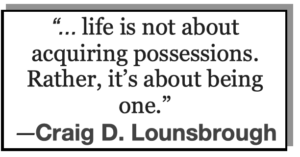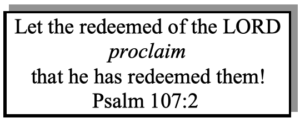He gave himself for us to redeem us from all lawlessness and to cleanse for himself a people for his own possession, eager to do good works. (Titus 2:14)
No scripture more clearly, simply, and emphatically explains redemption, freedom from the bondage to sin to serve the Lord. A closer examination of this verse, perhaps, shares all we really need to know for now about the efficacy of Jesus’s death. But like children, always eager to learn, we shall continue to seek deeper truths. But we must begin here.
 Jesus gave Himself, His crucifixion was voluntary. As He said, “No one takes it from me, but I lay it down on my own. I have the right to lay it down, and I have the right to take it up again. I have received this command from my Father.” (John 10:18) And He did this “for us.” This is not only voluntary but vicarious.
Jesus gave Himself, His crucifixion was voluntary. As He said, “No one takes it from me, but I lay it down on my own. I have the right to lay it down, and I have the right to take it up again. I have received this command from my Father.” (John 10:18) And He did this “for us.” This is not only voluntary but vicarious.
Some interpret the word “for” to mean “for our benefit” or “for our good,” a meaning worthy of the word, but an interpretation which cannot stand alone here because in so doing He has redeemed us. Redemption is first and foremost the purchasing of our salvation (ransoming us) by His blood (Acts 20:28) which is a vicarious substitution. Yes, indeed, for our benefit; because He did this (the translation simply reads “to”) in order that He might redeem us, (set us free via a ransom in His blood.)
“In order that” shows “purpose or end.” 1 Jesus’s death did not provide our freedom from sin’s bondage as an unintended consequence of a unfortunate death of a good prophet. Jesus, God’s Son, submitted to the Father’s plan and gave Himself willingly to the lash and the cross knowing that this was the means to our freedom from sin’s grasp!
Redeem, redemption, is a term that comes from the word meaning “to set free.” The truth could not be clearer. It is correctly understood as our “ransom” after the analogy of the Old Testament sacrifice, and some believers like to reference Hosea 3:1-2 where the prophet purchased his wife, Gomer, back off the slave auction block.
Freed us from what? Lawlessness. 2 This word supports Prof Craig’s contention that our Savior’s death was a penal substitution. 3 Martin Luther allegorically wrote, “The Law growls, ‘All right. If Your Son is taking the sin of the world, I see no sins anywhere else but in Him. He shall die on the Cross.’ And the Law kills Christ. But we go free.” 4
“I am using a human analogy,” Paul employed the slavery motif to explain that now instead of enslaved to sin, we should be our Lord’s life-long indentured servant. (Exodus 21:5-6) “because of the weakness of your flesh. For just as you offered the parts of yourselves as slaves to impurity, and to greater and greater lawlessness, so now offer them as slaves to righteousness, which results in sanctification.” (Romans 6:19)
 But not just a servant to God, but a “pure” or cleansed (from sinful thoughts and motives) servant of God; we serve no other lord. There is implied here no other motive or personal interest other than pleasing our Lord.
But not just a servant to God, but a “pure” or cleansed (from sinful thoughts and motives) servant of God; we serve no other lord. There is implied here no other motive or personal interest other than pleasing our Lord.
Because we are ransomed, He bought us with His blood, we are His, His own, His own possession! And the purity of our service is evident in an expressed zeal or passion to live for Him, to do “good works.” (We are reminded that one of the Fruit of the Spirit is goodness. Galatians 5:22; Ephesians 5:9)
Proclaim these things; encourage and rebuke with all authority. Let no one disregard[despise] you. Titus 2:15
Preach it! Teach it! Live it! And let no one’s hate shut you up!
2 “It is characteristic, of course, that [lawlessness] should become one of the chief terms for sin.” Kittell, vol IV. 1085
3 “Paul’s exposition of the way in which Christ’s death achieves reconciliation with God is suffused with forensic terminology rooted in Jewish notions of law and justice.” Craig. 51
4 Martin Luther, Epistle to the Galatians. 54-55

